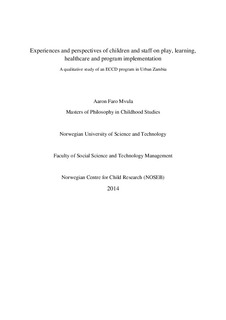| dc.description.abstract | The aim of this study is to explore and generate knowledge about cantered based ECCD as it is experienced by Orphans and Vulnerable children and staffs (adults) from the urban setting. This study was conducted at an ECCD Centre located in Garden compound in Lusaka, Zambia.
The social studies of childhood formed an overarching theoretical framework of the entire research process and supported by the children’s right perspective. In addition, the social exchange theory and norm of reciprocity shed light on the interdependent of parent- child relationship in relation to reciprocity and perceptions.
The empirical material for the study was collected between June and August 2013 with seventeen participants of which twelve were children and five were adults. Qualitative participatory methods; individual drawings, observations, interviews, focus group discussion and informal dialogues were employed.
The study revealed that Children’s everyday life at the centre revolved around two intertwined activities; play and learning however, children have preference for play over learning. In addition, it was revealed that education and care cannot be separated. The study also revealed diverse perceptions of play, healthcare and learning which have different policy and projects implication. The study brought to light that children are social actor with agency. In addition it was revealed that gendered play in early learning centre is instantaneous, momental and contextual. The study further revealed direct and indirect benefits of ECCD. Moreover, ECCD provides an arena for both formal and informal learning to children. However, lack of policy has affects the implementation of ECCD. The study also revealed that Local cultural practices in ECCD centre help children to transition smoothly between home and the centre and helps in maintenance of cultural heritage. The Use of the United Nations Convention on Rights of the Child (UNCRC) more than the African Charter on the Rights and Welfare of the child (ACRWC) in implementing ECCD has been influenced by donor funding. Finally, the study revealed multiple challenges that staff encounter in implementing centre based ECCD. The study revealed ambivalences surrounding the practice of ECCD resulting from a lack of policy framework. Therefore, I argue that ECCD policy should be built on Zambian culture and practices, a model that the local people and program implementers will identify themselves with and should include children’s views to meet their needs. | nb_NO |
